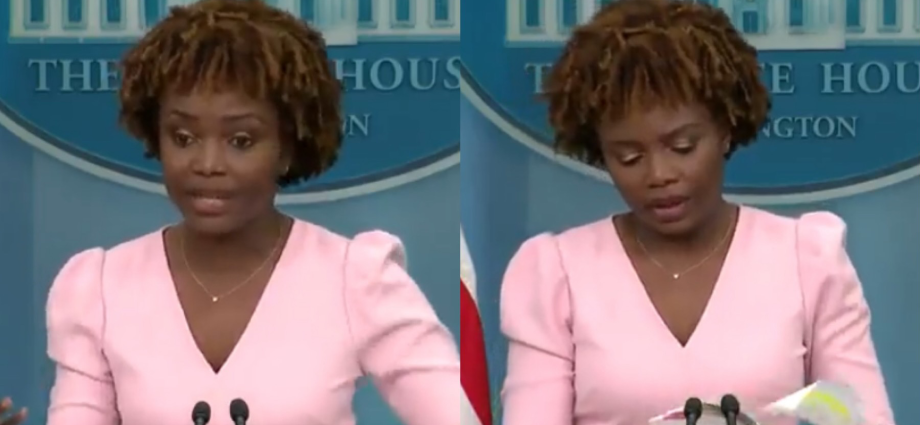A question about the baby formula shortage left White House press secretary Karine Jean-Pierre stumped today as she flipped through her binder for 20 seconds before admitting that she doesn’t have “anything new.”
Jean-Pierre was asked during her daily press briefing, “What is the latest update the White House has received on the baby formula situation across the country?”
“Yeah, let me see if I have anything new for you on that, because I think it has been a couple of days since we have been asked that question,” Jean-Pierre responded while flipping through her binder.
Jean-Pierre eventually gave up and told the reporter, “I don’t have anything new, I know we made some announcements last week, I just don’t have them in front of me.”
Ben Williamson shared the clip in a quote tweet and wondered, “How do you come in on a Monday afternoon and have ‘nothing new’ on a national crisis since Friday?”
How do you come in on a Monday afternoon and have “nothing new” on a national crisis since Friday https://t.co/geykM6M7LD
— Ben Williamson (@_WilliamsonBen) June 13, 2022
A recent USA Today op-ed suggested that the “Baby formula shortage hits low-income women, moms of color hardest.”
An op-ed in the Guardian explained recently what the author believes occurred:
In the case of baby formula, the government buys about half of all formula in the US, and it uses its buying power and a complex scheme of rebates to lower the cost to taxpayers. But these lower costs are not free. Baby formula monopolists give special prices to state governments in return for an exclusive contract to supply an entire state for the Special Supplemental Nutrition Program for Women, Infants, and Children. The net effect is that baby formula, if you are covered by the government, is free or low-cost, but if you are not getting government assistance, it’s much more expensive. By comparison, European formula prices are about half of US prices. This monopolized distribution system blocks new entrants from the market, so we are dependent on corporations like Abbott Labs. Layer on an extremely risk-averse regulator at the FDA, and you get a series of monopolies, a fragile supply situation, and boom: shortages.
The author also offered a solution to the problem:
The way to attack the problem is conceptually simple. We need to restore open and competitive markets. That means taking a couple of steps. First, policymakers should stop allowing exclusive contracts in return for rebates. That means means restructuring baby formula buying policy, but it also means repealing the anti-kickback exemption for GPOs, and enforcing laws against exclusive contracts and price discrimination in the form of rebates more generally. It also means breaking up power buyers where it’s possible to do so, reversing the merger waves that led to this problem. Moving these changes through the courts will take time, so in the meantime Congress should pass a law mandating that under all markets regulated by the FDA, either food or medical markets, no large buyer can purchase more than 20% of its supply of any commodity from any one supplier. This full spectrum approach would reorder our industries and end the pervasive shortage economy.
On Monday, June 6 the Biden administration announced the fifth flight of baby formula to the United States, although these efforts appear to be doing little to combat the crisis.
- Kat Timpf Updates Fans After Successful Double Mastectomy with Lighthearted Joke Post - March 20, 2025
- Pam Bondi Drops the Hammer, Announces Charges Against Three Tesla Arsonists With a Minimum Five Year Sentence - March 20, 2025
- Mike Johnson Is Re-elected as House Speaker After Two Republicans Flip Their Votes During First Round of Voting - January 3, 2025


5 Comments